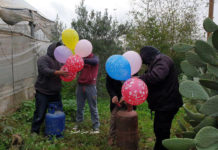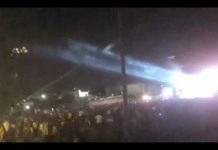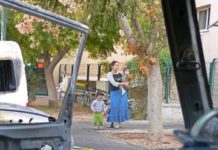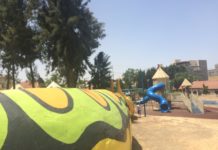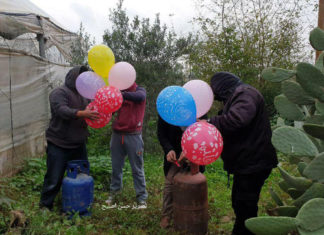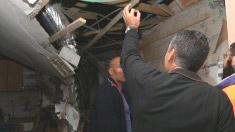
I recently visited the Amar family, on Sinai Street, whose home was hit last Thursday. The first person that greeted me was Aliza Amar, sitting in her wheel chair in front of her partially destroyed home. She looks sad and forlorn as neighbors come by to wish her and her family a quick recovery.
Aliza was hospitalized for almost four days for injury and shock. And because she is physically handicapped, the 15 second window the Tzeva Adom warning gives is not always enough time for her to make it to the bomb shelter, as was the case when a rocket hit the Amar home on Dec. 13.
“The force of the rocket blew me off the chair, and I slammed into the kitchen wall,” says Aliza.
Her home is devastated. The ceiling over the kitchen has completely collapsed. The sunlight pours through, illuminating a basket of orange tangerines covered with dirt and dust. Debris covers the entire kitchen floor, where a family photo lies nearby, its frame and glass broken into pieces.
“Everything went black, and the next thing I know, I am lying in the hospital in shock.” As Aliza speaks, her nine-year old daughter, Adi tightly holds her mother’s hand. I asked her how she feels to have her mother back home, but Adi does not respond.
Her older brother, Moshe, is quick to explain that from all his siblings, Adi suffers the most from anxiety attacks. “Every time, the siren sounds, Adi runs to those photos of great and righteous rabbis on the living room wall, and kisses them, hoping they will keep her safe.”
Moshe, who is serving his first year in the IDF army, was stationed at his base when the rocket hit his home. “As a soldier in the IDF, my job is to guard the jail where the terrorists who launch the rockets are caught and held,” he said. “It is a very difficult job for me, especially when I receive a call notifying me that my home and family have been hit. I leave the army base to come to my destroyed home. What am I fighting for? There is no limit to the number of terrorists in Gaza who continue to launch rockets freely against my friends and family in Sderot.”
Indeed, Moshe’s family is currently living in a hotel in the nearby city of Ashkelon, as it will take several months for the insurance company to rebuild and fix the extensive damage done to the Amar home. Moshe’s father, Pinchas, explained that their house is not the only home that was hit in the Thursday rocket attacks. Their Sasson family’s house next door was also damaged by a Qassam.
The mother, Shula Sasson, however was less fortunate. She was transported to the hospital for shock and was treated for head trauma. Her husband and children were also treated for trauma and waited almost a week for Shula’s return home.
The Amar and Sasson families, along with the rest of the families on Sinai street, have experienced seven rocket attacks on their neighborhood. One of the most traumatic attacks took place in May 2007, when a rocket hit a synagogue, which only a half-hour earlier had been full with 400 congregants. The families on Sinai Street have seen many miracles, but the shock and trauma which results from each rocket attack continues to increase among the residents here.
It is the silence of nine-year old Adi Amar which is perhaps most unnerving and reflective of the trauma children of Sderot live through. Although she barely spoke during my visit, Adi’s sad and fearful eyes expressed her feelings more clearly than words.
I left the Amar home overcome with a sense of helplessness that has come to define the current spirit of Sderot residents.
Anav Silverman is a 2004 Calais High School graduate. She works in the Sderot Media Center and is a student at Hebrew University of Jerusalem and Bar Ilan University in Ramat Gan, Israel.



